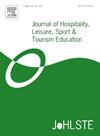TikTok作为高等教育的学习工具:规模的验证
IF 4.1
2区 教育学
Q1 EDUCATION & EDUCATIONAL RESEARCH
Journal of Hospitality Leisure Sport & Tourism Education
Pub Date : 2025-03-28
DOI:10.1016/j.jhlste.2025.100548
引用次数: 0
摘要
在我们日益数字化的社会中,社交媒体在教育领域脱颖而出,促进了在线和混合式教学环境的创造。在这些平台中,以具有特效和音乐的动态短视频而闻名的TikTok脱颖而出。尽管TikTok在年轻人中越来越受欢迎,大学教育工作者也对其教学用途进行了初步探索,但它的教育效益在很大程度上仍未得到探索。这一差距部分是由于缺乏有效的研究工具来评估其潜在的教育影响。本研究通过调整和验证一个新的量表“TikTok-SportEdu”来解决这一差距,样本为250名西班牙体育科学大学的学生(M = 22.56;sd = 3.55)。TikTok- sportedu量表由三个维度的15个项目组成——1)TikTok作为大学教学工具,2)TikTok作为专业个人资料开发工具,3)TikTok作为互动和了解体育产业发展的工具——显示出强大的心理测量特性。TikTok- sportedu的规模将使教育工作者、教育机构、政策制定者和行业专业人士更好地了解TikTok在高等教育中的战略用途,为未来的研究提供可靠的工具。本文章由计算机程序翻译,如有差异,请以英文原文为准。
TikTok as a learning tool in higher education: Validation of a scale
In our increasingly digitalized society, social media have emerged prominently within the educational landscape, fostering the creation of online and blended teaching-learning environments. Among these platforms, TikTok, renowned for its short dynamic videos featuring effects and music, stands out. Despite its growing popularity among youth and initial explorations of its pedagogical use by university educators, the educational benefits of TikTok remain largely unexplored. This gap is partly due to the absence of validated research tools to assess its potential educational impact. This study addresses this gap by adapting and validating a new scale, “TikTok-SportEdu”, with a sample of 250 Spanish sport sciences university students (M = 22.56; SD = 3.55). The TikTok-SportEdu scale, comprising 15 items across three dimensions—1) TikTok as a university teaching-learning tool, 2) TikTok as a professional profile development tool, and 3) TikTok as a tool for interaction and staying informed about sport industry developments—demonstrates robust psychometric properties. The TikTok-SportEdu scale will enable educators, educational institutions, policymakers, and industry professionals to better understand the strategic use of TikTok in higher education, providing a reliable instrument for future research.
求助全文
通过发布文献求助,成功后即可免费获取论文全文。
去求助
来源期刊
CiteScore
8.10
自引率
10.80%
发文量
41
审稿时长
42 days
期刊介绍:
The Journal of Hospitality, Leisure, Sport and Tourism Education (JoHLSTE) is the leading international, peer-reviewed educational journal for this subject grouping. Its aims are to: a) Promote, enhance and disseminate research, good practice and innovation in all aspects of higher education in Hospitality, Leisure, Sport and Tourism and Events to its prime audience including teachers, researchers, employers, and policy makers. b) Encourage greater understanding, links and collaboration across its constituent fields. JoHLSTE is designed to have maximum impact through it being available on-line, fully archived and peer-reviewed. JoHLSTE is divided into seven sections: Editorial; Academic Papers; Practice Papers, Perspectives, Comments and Rejoinders, Research Notes and Reports and Education Resource Reviews.

 求助内容:
求助内容: 应助结果提醒方式:
应助结果提醒方式:


